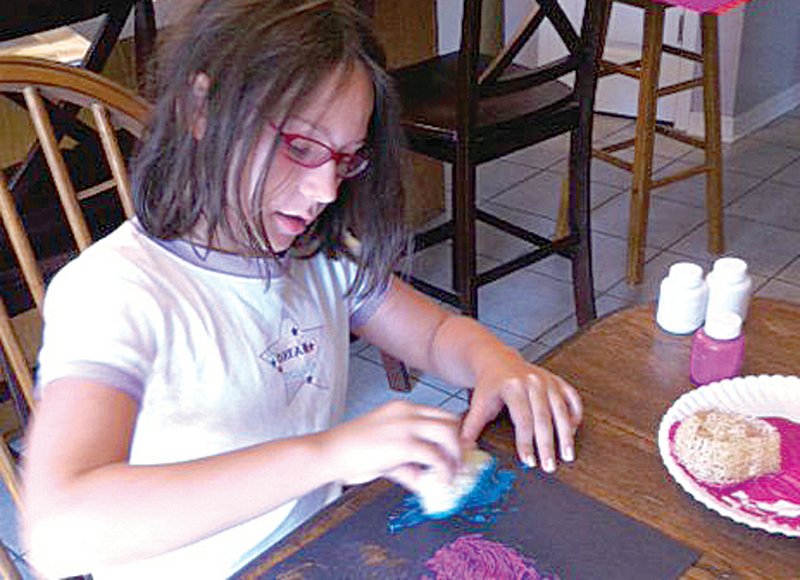CABOT — When Cathy Staton looks at a loofah sponge, she sees more than just something to smooth rough feet.
Through her nonprofit, Lufa Life, Staton has turned the fibrous plant product into a symbol for child-abuse prevention. Along with a group of more than 20 volunteer gardeners, Staton grows luffa plants to raise money for charities that help prevent child abuse, and aid and shelter its victims. She also takes the loofah sponges into schools, encouraging students to create sponge paintings while she talks to them about abuse prevention and the “circle of safety” that the round loofah sponge represents.
“We talk to them about friends they can talk to; phone numbers, including hotlines, to call; and a plan of what they were to do if they were in a bad situation,” Staton said.
So far, Staton has given the presentation at Southside Elementary School in Cabot and hopes to visit more classrooms this year.
Staton started the group two years ago with a goal to raise funds by having people make donations in exchange for loofah-sponge products and by selling the loofah sponges at craft fairs and farmers markets. So far, the club has donated more than $2,500 to groups that include the United Methodist Children’s Home and the Open Arms Shelter in Lonoke.
With a lifelong love for gardening and plants, Staton, a Master Gardener, first started growing luffa plants 10 years ago.
“My father-in-law is a Master Gardener as well and knew someone who had the seeds,” Staton said. “I thought it was fascinating and started growing them.”
The luffa plant looks and grows much like an oversized cucumber. Grown on a vine, the fruit of the plant can be eaten if it’s harvested young. When left on the vine to mature, die and dry, the inside of the plant becomes the hardened fibrous material used as loofah sponges.
“You can use it in the kitchen, in the bath,” Staton said. “People say it’s great for getting bugs off cars and tires. It’s a sponge that really lasts.”
Staton said it is best to plant luffa right after the last frost, typically around Tax Day in Arkansas. The plant has a long growing season, taking 140 days from the day the seeds are planted to the day it can be harvested.
“If you plant in April or May, you don’t pick until the first frosts come in October or November,” Staton said.
Each plant can have up to around 10 fruits on it and should be planted 2 or 3 feet apart in direct sunlight.
“They’re good at attracting bees, so they’re great for the garden pollination,” Staten said.
In addition to sponge products, Staton makes sponge-painting kits for kids and bracelets decorated with luffa plant seeds to sell or donate for charity. Drilling holes in tiny seeds to make bracelets was a process of trial and error for Staton, but now she easily paints the seeds to decorate wire-crochet bracelets, necklaces and earrings. Soon, she hopes to come up with a charm to sell.
Since the growing season won’t start for several more months, Staton is working to recruit more gardeners to help the organization this summer. Staten said the plants are fairly low-maintenance, rarely attracting any pests, unless the plant is in the shade.
“A lot of people like to grow luffa plants for the novelty,” Staton said. “But for others, it’s a great way to help and benefit children.”
Staton said many people are surprised to know that loofah sponges start out as a plant on a vine.
Station is married to Shane Staton, a youth pastor at First Methodist in Cabot, and the couple have a 10-year-old daughter, Victoria. Staton is currently in her fourth year of school at the University of Central Arkansas, where she’s working on a doctorate in counseling psychology. Staton said it was her schooling in psychology that made her interested in trying to give back to victims of child abuse and find a way to prevent it.
“One in five children end up being abused in some way,” Staton said. “If kids can be taught about fire
prevention and how to
survive natural disasters … which so rarely occur … children need to be given information about abuse prevention, too.”
For more information, or to get involved with the group, go to lufalife.com.
Staff writer Emily Van Zandt can be reached at (501) 399-3688 or evanzandt@arkansasonline.com.
